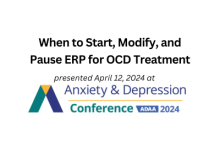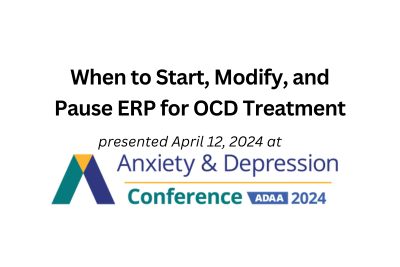
This presentation was recorded at the ADAA 2024 Conference and is not eligible for CE/CME credit.
Any clinician who has conducted Exposure and Response Prevention (ERP) for obsessive-compulsive disorder (OCD) can relate to the difficulties of starting treatment with a patient. A range of factors can prevent someone from beginning ERP, such as level of insight and motivation, co-morbid psychiatric disorders, and life stressors. Do you try to start ERP despite these factors? There is no simple answer and each case requires thoughtful consideration. Every clinician must also decide when to modify or pause ERP for OCD treatment. The decision to pause can be easy to make when a patient has made progress and is ready to practice ERP on their own, but even then, considerations must be made to ensure that progress is maintained without regular meetings.
More complicated decisions arise when clinicians have worked with someone for a period of time, but they are having trouble engaging or progressing. How long do you work with this person before you both decide to modify or pause treatment? To ensure you have given the patient every opportunity to succeed with exposures, the incorporation of other modalities may be needed, including Motivational Interviewing.
Maybe the patient has tried passive exposures only and can’t make the jump to active exposures and this continues for months despite motivational interviewing. Sometimes adding an Acceptance and Commitment Therapy (ACT) approach can be helpful, living a life in line with our values can build motivation for exposures. In addition, leaning into cognitive therapy may help to challenge unhelpful beliefs about OCD and move someone towards exposures. Some cases become long-term despite a lack of treatment progress and our efforts to stick with treatment fidelity, leaving both the patient and clinician frustrated. Pausing ERP treatment may be an appropriate next step, but it can be challenging to begin the process and formal guidelines for pausing are sparse.
This talk aims to unpack the decisions behind starting, modifying, and pausing ERP with a patient. We will examine example cases and apply research findings to develop guidelines for this challenging decision-making process.













